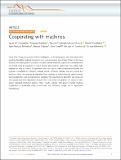Cooperating with machines
Author(s)
Crandall, Jacob W.; Oudah, Mayada; Tennom, Mayada; Ishowo-Oloko, Fatimah; Abdallah, Sherief; Bonnefon, Jean-François; Cebrian, Manuel; Shariff, Azim; Goodrich, Michael A.; Rahwan, Iyad; ... Show more Show less
Downloads41467-017-02597-8.pdf (1.332Mb)
PUBLISHER_POLICY
Publisher Policy
Article is made available in accordance with the publisher's policy and may be subject to US copyright law. Please refer to the publisher's site for terms of use.
Terms of use
Metadata
Show full item recordAbstract
Since Alan Turing envisioned artificial intelligence, technical progress has often been measured by the ability to defeat humans in zero-sum encounters (e.g., Chess, Poker, or Go). Less attention has been given to scenarios in which human-machine cooperation is beneficial but non-trivial, such as scenarios in which human and machine preferences are neither fully aligned nor fully in conflict. Cooperation does not require sheer computational power, but instead is facilitated by intuition, cultural norms, emotions, signals, and pre-evolved dispositions. Here, we develop an algorithm that combines a state-of-the-art reinforcement-learning algorithm with mechanisms for signaling. We show that this algorithm can cooperate with people and other algorithms at levels that rival human cooperation in a variety of two-player repeated stochastic games. These results indicate that general human-machine cooperation is achievable using a non-trivial, but ultimately simple, set of algorithmic mechanisms.
Date issued
2018-01Department
Massachusetts Institute of Technology. Media LaboratoryJournal
Nature Communications
Publisher
Nature Publishing Group
Citation
Crandall, Jacob W. et al. “Cooperating with Machines.” Nature Communications 9, 1 (January 2018): 233 © 2018 The Author(s)
Version: Final published version
ISSN
2041-1723